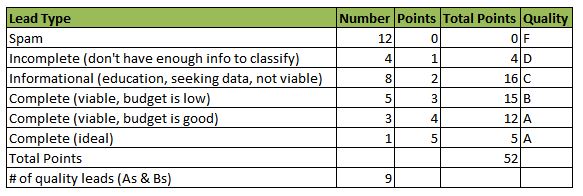Measuring your SEO performance is essential.
We’re fortunate enough to have access to some incredibly powerful and useful SEO tools – both free and paid – that help us understand what is and isn’t working.
But which metrics should you be measuring with these tools?
How to Measure SEO: 3 Key Questions
In general, I like to think about what makes sense for measurement.
It comes down to these three key questions:
What Can I Measure?
There are thousands of different metrics you can try to measure, but only a finite set you can measure.
For example, if you’re working for a Fortune 500 company, you probably have data on customer reach, A/B testing, market share, revenue, and many other metrics.
However, if you’re doing SEO for a small business focused on a single retail store with a small e-commerce website, you probably rely a lot more on your gut to make decisions. And, as valuable as that is, it’s not measurable.
What is Important to My Boss and/or Company?
You have to make your boss happy.
Maybe you have revenue goals you have to reach per quarter, or maybe your boss is focused more on traffic or even the average position you hold in Google (more on that later). Maybe he or she just wants to be first for their own name.
Some of these metrics will be reasonable, and some will be less so.
Ultimately you have to measure the things that will make your boss or customer happy. Make sure you know what success looks like for them.
What Can I Control?
You may not want to measure yourself on things you can’t control.
For example, if you have no access to change content on your site (don’t laugh, it happens), or if you have no ability to get IT to make changes on your behalf, you wouldn’t want to measure things that are associated with those elements you can’t control.
In a perfect world, we can affect change in multiple realms. But, in reality, we often have our hands tied.
Don’t measure yourself on things you can’t impact.
OK, now that you’ve answered those questions, it’s time to start measuring.
Here are four key areas you should measure for SEO.
1. SEO Traffic
You should track the amount and trend of the traffic (visits) being driven to your site from SEO sources.
You may wish to only track Google organic traffic, or you might want to track other search engines or organic as a whole.
Lots of people track organic traffic as a percentage of regular traffic, but I think this metric is flawed for a lot of reasons, most notably that any fluctuations in paid activity will render this metric useless.
I like to track traffic to certain sections of the site:
- Main pages.
- Category pages.
- Product or informational pages.
- Blog or news pages.
This helps me more effectively narrow what impact certain efforts have had on our success.
2. SEO Position or Ranking
Lots of SEO professionals have gone on record saying they hate ranking reports. They think ranking is a highly flawed metric.
This is true, in general. With personalization, localization, numerous search features (e.g., featured snippets, Knowledge panels), and so many other variables at play in the SERPs, saying you’re ranked #1 for a term has little meaning.
Instead, I encourage my clients to look at trends.
- Group keywords in categories and track them over a long period of time. Look at the average position for these keywords over time.
- Measure the “true rank” of the result – is it #1 for organic, but actually #7 when you factor in PPC and local listings?
- Track the page that is ranking for a keyword. Does it remain consistent, or fluctuate? This could indicate internal competition for the phrase. Is it ranking really well for a certain group/category of keywords? This may indicate that you’re doing something right on this page; something you can apply to other areas of your site.
3. Customer Engagement
This is a very difficult element to track because it could be made up of so many different things.
Ultimately, here’s what you want to know: once you get a visitor to your site, do they take some sort of action? What that action is may vary by site.
One site may want the customer to hang out and read a lot of pages, in which case, a long time on site and many pages viewed per session may be the ideal.
Another site may want the customer to make a purchase, in which case the funnel and progression to sale is the ideal.
And still another site may want the customer to complete a lead form, in which case the completion of the lead form is ideal, and this will probably require very few steps and maybe no funnel at all, with a very short time on site.
Some sites will want returning customers, and some will want new customers. Most will want a good combination of both. Often a key metric is the number of new customers that SEO drives.
While customer engagement metrics vary greatly, it’s a key element of measuring SEO success, and it should be part of your overall goals.
4. Revenue or Leads Generated
Finally, we come to what is most important for most sites. Revenue.
This may take the form of completed sales, or it may be the generation of quality leads.
Revenue is pretty easy to track, but where people often get hung up is lead tracking.
What I’ve done with several clients is to set up a lead tracking system. When they get the lead, the first thing they do is classify it, using a system of points like this:

By classifying the leads, they can let the SEO team know how many “points” in leads were generated each week. Then it becomes a viable metric that can be trended and tracked.
Conclusion
These four key SEO metrics are just the start – and each is super important. But there are many more ways to measure SEO.
So if you aren’t already measuring your SEO success, don’t wait any longer. Get started today!





![AI Overviews: We Reverse-Engineered Them So You Don't Have To [+ What You Need To Do Next]](https://www.searchenginejournal.com/wp-content/uploads/2025/04/sidebar1x-455.png)